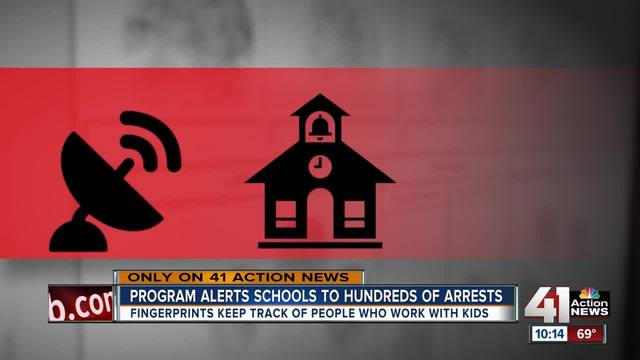If someone who works with or around your kids got arrested, would you want to know?
A recently launched program sends most Missouri school districts an alert once law enforcement scans their fingerprints into the system. Since July 2016, Missouri’s "RAP Back" program has sent about 400 notifications.
The 'RAP' in 'RAP Back' means 'record of arrest and prosecution', 'back' is short for background.
SEE IF YOUR DISTRICT GOT AN ALERT
“If they are at the school or around the school or anything, of course!” said Danielle Shobe in Odessa. “I mean my child goes here. I need to know that.”
We showed Shobe and Jessie Lee, a grandparent in Odessa, an alert sent to their district. Someone who worked around Odessa students faces a felony charge for unlawful possession of an explosive weapon.
"We need our children to be safe and that’s not safe,” said Lee. “That’s not safe at all.”
Odessa Superintendent Bob Brinkley credits the new program with alerting the district.
“We wouldn’t have caught that for some time had we not received that report from the highway patrol," Brinkley said.
How it works
The fingerprints taken by law enforcement trigger an alert when they match the fingerprints taken for employee background checks.
At no additional cost to the schools, the program monitors people in the following positions:
- Administrators
- Teachers
- Aides
- Paraprofessionals
- Assistants
- Secretaries
- Custodians
- Cooks
- Nurses
- School bus drivers
The Department of Elementary and Secondary education gets alerts for certified personnel including teachers, administrators, and substitute teachers.
Before this system, Eric Avant and his team at DESE relied only on their own research in between annual background checks to try to make sure nothing fell through the cracks.
"If a person were convicted, we might not in some situations know for a year," he said. "Maybe."
But long-time employees are likely not in this new database.
The Missouri Highway Patrol said the program right now only monitors people fingerprinted for DESE or an enrolled school district since July 1, 2015.
Kansas City Public Schools has hired 453 people since then. That makes up only about 17 percent of its 2600 total employees. But the district has been requiring fingerprint background checks for all new employees for several years according to district spokesperson Ray Weikal.
State statute requires school districts to make sure fingerprints are submitted for criminal background checks for applicable employees hired after January 2005. The Lee's Summit School District, for example, told us they have not gone back to collect fingerprints from employees hired before 2005.
This program doesn’t cross state lines even though states like Kansas and the FBI have similar programs. The Kansas State Department of Education has used its program since 2011. It doesn’t cross state lines either.
Some of those hundreds of alerts in Missouri went to local districts like Odessa, Kansas City, Lee’s Summit, and Park Hill.
The majority of the state’s more than 500 school districts and charter schools in Missouri have enrolled in the program.
Some schools opted out
Gordon Parks Elementary was one of almost 30 schools and districts that opted out of the program. When 41 Action News asked why, Chief Education Officer Joe Palmer admitted he didn’t know.
“I was thinking something may have slipped through the cracks because I really wasn’t aware of what you were talking about,” he said. “I probably checked no. I’m sure I probably did.”
But after our call to ask why and discussions with leaders at other schools, Palmer said Gordon Parks signed up for the RAP Back program.
A handful of other schools and districts didn’t return the required paperwork.
SEE IF YOUR SCHOOL OR DISTRICT OPTED OUT or DID NOT COMPLETE PAPERWORK
Many of the districts that opted out of the program are listed in rural areas.
The administrator of the Kingston 42 School District, Andrea Heironymus, told 41 Action News their school board decided to opt out of the program because of the small size of the district. She said they believed the notifications DESE received would be enough.
With the program being fairly new, Avant said DESE is working on getting more information out to get more districts enrolled.
Concerns from the ACLU
Not every alert or arrest will result in a conviction or even charges.
“In our country, you are innocent until proven guilty and yet your employer can be notified just because you are arrested,” said Jay Stanley with the American Civil Liberties Union.
Employers at school districts and DESE officials getting those alerts concerns the ACLU.
“A lot of arrests are kind of bogus,” said Stanley. “People get swept up in mass arrests for protest rallies, for example. Sometimes just because they’re walking by when something goes down.”
“We can’t take action on a maybe,” said Avant. “If it is only an arrest and there are no cases going or anything like that, we can only monitor.”
Avant said state statute dictates exactly what prompts action from DESE. When schools or districts get an alert, what happens next is up to them.
Palmer appreciates the extra eyes to keep track at Gordon Parks Elementary.
“Knock on wood, I’ve been in this game a long time and haven’t had anything major come up,” he said. “But it could tomorrow.”
----------




